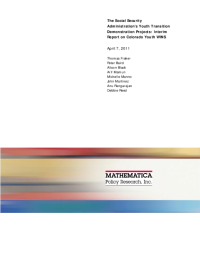Interim Report on Colorado Youth WINS
The Youth Transition Demonstration (YTD), led by Mathematica Policy Research, MDRC, and TransCen, Inc., is a large-scale demonstration and evaluation sponsored by the Social Security Administration (SSA) to improve understanding of how to help youth with disabilities reach their full economic potential. In particular, SSA is interested in developing and testing promising approaches for helping young people with disabilities become more self-sufficient and less reliant on disability benefits. The YTD program model, which is based on best practices in facilitating youth transition, specifies that the six projects participating in the evaluation provide employment services (emphasizing paid competitive employment), benefits counseling, links to services available in the community, and other assistance to youth with disabilities and their families. Additionally, participating youth are eligible for SSA waivers of certain benefit program rules, which allow them to retain more of their disability benefits and health insurance while they work for pay. Using a rigorous random assignment methodology, the YTD evaluation team is assessing whether these services and incentives are effective in helping youth with disabilities achieve greater independence and economic self-sufficiency. The earliest of the evaluation projects began operations in 2006 and ended in 2009. The latest started in 2008 and will end in 2012.
This report presents first-year evaluation findings for the Colorado Youth WINS (Work Incentive Network of Supports) YTD project, which served youth in four counties from August 2006 to December 2009. While it will take several more years to fully observe the transitions that youth participants make to adult life, early data from the evaluation provide rich information on how the Youth WINS project operated and the difference it made during the initial stages of the transitions. Specifically, the report includes findings from a process analysis of Youth WINS, including a description of the program model, how the project was implemented and services were delivered, and the project’s fidelity to the YTD program model. The report also includes impact findings, based on data collected 12 months after youth entered the evaluation, on the use of services, paid employment, participation in education, income from earnings and benefits, and attitudes and expectations.
In brief, the Youth WINS project, as implemented, deviated from the YTD program model in ways that may have reduced its potential to achieve certain critical YTD objectives. In particular, the project focused more on case management and less on the delivery of employment services directly to youth than indicated by the YTD program model. Notwithstanding that focus, the impact analysis revealed that youth who had been given the opportunity to participate in Youth WINS were more likely to have used services to promote employment than youth in a randomly selected control group. However, the program had no impacts on key measures of youth employment, income, and expectations during the year following random assignment.






